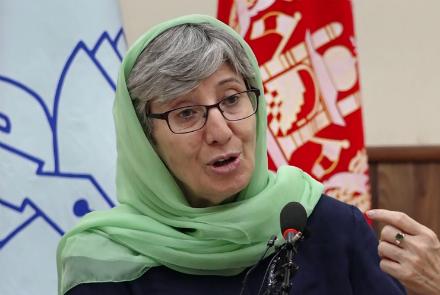Former chairperson of Afghanistan Independent Human Rights Commission, Simar Samar, on Thursday said that the publication of Transitional Justice Report (TJR) was supposed to be among the responsibilities of the incumbent president and his predecessor.
She said that the responsibility of the human rights commission was to prepare a documented report from involving events of the past more than two decades which include major cases of crimes against humanity, war crimes, and the violation of human rights.
Samar stated that the document was delivered to former President Hamid Karzai and now it is lying with his successor President Ashraf Ghani.
This comes a day after Ghani appointed new head and commissioners for Afghanistan Independent Human Rights Commission, replacing Samar with Sharzad Akabr an advisor to the National Security Council.
Samar was appointed as President Ghani’s Special Envoy and State Minister for Human Rights Affairs and International Relations.
“The report was finalized in 2011 and it is available. I don’t regret that I didn’t publish it. Because the responsibility of its publication goes to our former president and the incumbent president. I delivered the report to both of them and both were asked to publish it, but they did not want to publish it. But it is a need to provide the report to the future generation of Afghanistan which involves over 20 years history of Afghanistan which has been documented,” said Samar.
“The most important thing is to take those measures which could stop the cycle of violence in Afghanistan. But we are aware that the Afghan government so far has not taken any step. Therefore the responsibility goes to the Afghan government and the international community rather than the independent human rights commission,” said AIHRC commissioner Musa Mahmoudi.
TOLOnews’ reporter couldn’t get a message from the presidential palace and former president Karzai.
Meanwhile, the human rights commission has called both on the Afghan government and the international community to work together for giving an end to the culture of impunity, particularly against those who are accused of crimes against humanity.
The Transition Justice Report has documented events of crimes against humanity in Afghanistan between 1988 and 2001. However, in 2006, the Afghan parliament approved legislation based on which, those involved in the violation of human rights and crimes against humanity over the past three decades are granted some type of impunity.
“The commission still wants to see that serious measures are taken for accountability for justice, removing the culture of impunity. We had program and has it now too and it is a serious recommendation regarding the transitional justice; its second portion which comprises events of numerous and unprecedented crimes such as bombings, suicide attacks, attacks on mosques, health centers, educational centers, schools, inhuman tortures and these are the issues which need to be shared with the people of Afghanistan,” added Mahmoudi.
“We have not lost many issues when it comes to the issue of transitional justice. You imagine when someone in parliament comes and say that person is free and they can not implement human rights on us, but today in his speech, the same person repeat the term of human rights three times in his speech, isn’t it like that? Transitional justice does not mean only execution,” said Samar.
With all the episodes which have out of the three decades of war, a new report by the AIHRC indicates that 98.5 percent of the Afghans are supporting the current political system and only 1.5 percent have supported the return of Taliban’s Islamic Emirate system of governance.



Comment this post